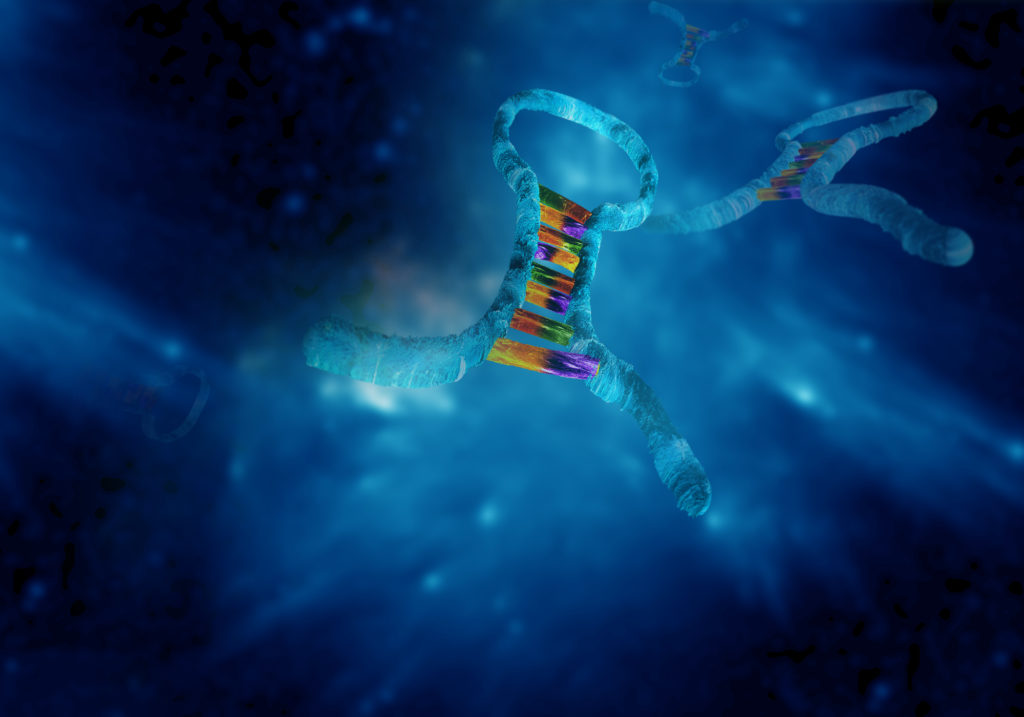Therapeutic strategies in patients with acute myeloid leukemia (AML) have remained relatively unchanged over the last 30 years. The development and delivery of new therapeutic strategies for high-risk AML, including immunotherapy, therefore remains a priority.
Tumor phenotypes are dictated not only by the neoplastic cell component, but also by the tumor microenvironment, which includes immune and inflammatory cells and mediators. Leukemia cells avoid host immune surveillance to promote tumor survival and progression. A key pathway mediating feedback inhibition and hindering anti-tumor immunity involves indoleamine 2,3-dioxygenase-1 (IDO1), an interferon (IFN)-g-inducible molecule.
NanoString’s 3D Biology™ Technology, which enables simultaneous profiling of any combination of SNV, RNA, protein, and phospho-protein targets with as few as 5,000 cells or just two successive 5 micron FFPE slices, was used in this research study to collect comprehensive molecular profiles across the biological heterogeneity of childhood and adult AML, with the aim to identify new molecular targets for specific immunologic subtypes of AML.
Bone marrow (BM) specimens from 70 patients with non-promyelocytic AML were profiled on the nCounter® system. Ninety BM samples were analyzed with the nCounter PanCancer Immune Profiling Panel. The Vantage 3D DNA:RNA:Protein Heme alpha assay was used to dissect the intracellular signaling pathways that are activated in leukemia cell lines in response to IFN-g. The assay profiles 180 mRNA species involved in heme-oncology pathways, >38 total and phosphorylated proteins, and >124 single nucleotide variants relevant to hematological malignancies. BM biopsies from patients with AML were also analyzed with NanoString’s Digital Spatial Profiling Technology to investigate co-localization of CD8+ T cells and “actionable” negative immune checkpoints, such as PD-L1, and to characterize the quality of the BM-infiltrating T cells.
In conclusion, this research study has identified heterogeneous immunological profiles in children and adults with AML at different disease stages. From a clinical standpoint, ‘immune enriched’ AML might be amenable to immunotherapy approaches tailored to the BM microenvironment, including blockade of co-inhibitory molecules and/or small-molecule IDO1 inhibitors.
Join us to learn more about how the combined analysis of SNV, mRNA, and protein expression on the nCounter system enabled a comprehensive characterization of the molecular landscape of leukemia cells.
Speakers

Doug Hinerfeld, Ph.D., Principal Product Application Scientist, NanoString Technologies
Doug Hinerfeld, Ph.D. is the Principal Product Application Scientist for NanoString 3D Biology Technology. In this role at NanoString, he is responsible for the development of novel applications for the 3D Biology portfolio. He received a B.A. in Psychology from The University of Colorado, Boulder and a Ph.D. in Genetics and Molecular Biology from Emory University.

Sergio Rutella, M.D., Ph.D., Professor of Cancer Immunotherapy, John van Geest Cancer Research Centre, Nottingham Trent University
Professor Sergio Rutella is a physician-scientist and Fellow of the Royal College of Pathologists, United Kingdom, with a broad background in tumor immunology, leukemia biology and stem cell transplantation. He received his M.D. from the Catholic University Medical School of Rome, Italy, in 1993 (summa cum laude), followed by residency and fellowship in Hematology in 1997 (with honors) and Ph.D. in Experimental Hematology in 2001 (with honors).
Before joining the John van Geest Cancer Research Centre at Nottingham Trent University as the Professor of Cancer Immunotherapy in September 2016, Sergio was the Executive Director of Clinical Research at Sidra Medical & Research Centre, Doha, Qatar (2014-2016) and served as the Chairman of Immunohematology and Transfusion Medicine at the Bambino Gesú Children’s Hospital in Rome (2012-2014). Previous to these posts, he was Consultant Hematologist at the Department of Pediatric Hematology/Oncology of the Bambino Gesú Children’s Hospital (2011-2012) and Consultant Hematologist and Assistant Professor of Hematology at the Catholic University Medical School in Rome (2000-2011).
Who Should Attend?
Job Functions:
|
Research Areas:
|
Xtalks Partner
Nanostring
NanoString Technologies (NASDAQ: NSTG) is a publicly held provider of life science tools for translational research and molecular diagnostics. The company’s technology enables a wide variety of basic research, translational medicine and in vitro diagnostics applications.
NanoString’s products are based on a novel digital molecular barcoding technology invented at the Institute for Systems Biology (ISB) in Seattle under direction of Dr. Leroy Hood. The company was founded in 2003 with an exclusive license to develop and market the technology. In 2008, NanoString launched its first commercial instrument system and began international sales operations with its first multiplexed assays for gene expression analysis. In 2010, the company launched new applications for the system to support microRNA analysis and copy number variation detection, and in 2013 launched Prosigna®, its first in vitro diagnostic product for prognosis of early stage breast cancer.
Organizations performing cancer research, biomarker validation and screening, and next-generation sequencing validation are rapidly adopting the nCounter® Analysis System. By providing simple, multiplexed digital profiling of single molecules, the NanoString platform represents a natural, digital downstream companion to next-generation sequencing and enables researchers to embark on studies that were previously inconceivable.
Leading researchers and institutions are finding that NanoString’s nCounter system provides the ideal platform on which to validate their discoveries and translate them into clinically useful diagnostic assays. The nCounter system is uniquely positioned to support translational research because it provides more reproducible results than methods requiring amplification, and generates high-quality data from the difficult sample types common in clinical research, including Formalin-Fixed Paraffin-Embedded (FFPE) tissues.
In addition to continuing to extend the applications for the nCounter system in the discovery, target validation and routine testing segments of the genomics research market, the company’s goal is to become the platform of choice for diagnostic testing based on multiplexed gene signatures that can be offered in hospitals and pathology laboratories worldwide, following appropriate regulatory approvals. These two synergistic areas of business focus provide researchers with a seamless transition from discovery to diagnostics.
You Must Login To Register for this Free Webinar
Already have an account? LOGIN HERE. If you don’t have an account you need to create a free account.
Create Account





